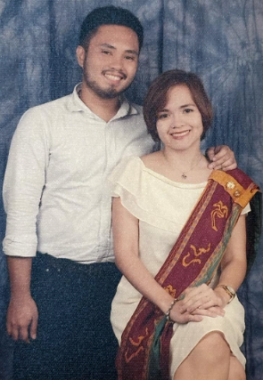How my advocacy fulfills my college’s call to ‘Serve the People’
As a University of the Philippines graduate, I've found my way to contribute
Written by |

When the University of the Philippines (UP) unveiled its new motto, “Honor. Excellence. Service.,” this past June, it took me back to my days there as a student. The phrase “Serve the People” reverberates through the campus, reminding every Iskolar ng Bayan (Nation’s Scholar) of the university’s deep-rooted commitment to activism. It’s a powerful call to action, urging students to challenge injustices and stand up for those without a voice.

Alliah Czarielle poses with her now-husband, Jared Formalejo, on her graduation day from the University of the Philippines in 2017. (Courtesy of Alliah Czarielle)
Activism is at the heart of UP’s culture. Students are encouraged to confront societal issues, question authority, and make meaningful contributions wherever they go. One doesn’t simply go to this university to earn a degree; it’s far more important that they use their knowledge to create real change.
For me, “Serve the People” is more than just a battle cry; it’s a guiding principle. And yet, as an alumna who chose an unconventional career path, I sometimes wonder if I’m contributing enough to society. Many of my high school and college peers have gone on to become doctors, academics, scientists, and public servants. While I’m genuinely happy for them, it’s hard not to compare my path with theirs.
Growing up hypercompetitive like many millennials, I always believed my worth was tied to my academic achievements. But I now see that true value isn’t always found in reaching conventional milestones. It’s also about contributing to society in ways that are meaningful, even if unconventional or small.
Finding my own path of service
I may not have a linear career or hold a prestigious title, but I’m passionate about my advocacy work for the disabled community. My husband, Jared, has hemophilia, which has shaped how we approach many aspects of our lives, especially after starting a family. My pursuit of advocacy wasn’t a career move, but rather a personal choice to stand by Jared and find ways to improve quality of life for him and his peers with blood disorders.
In many ways, my UP education prepared me for this role. Although I wasn’t a top student and even switched from a science degree to the arts, the academic challenges helped me understand the complexities of hemophilia. Studying genetics in biology, for instance, gave me a solid grasp of hemophilia’s manifestation and hereditary patterns. This scientific background became invaluable not only in managing Jared’s condition day to day, but also in my writing about hemophilia and collaborating with his patient organization, HAPLOS.
Aligning with UP’s motto through advocacy
UP’s new motto emphasizes service, but not in a way that prescribes a single path. Service can come in various forms — through corporate success, academia, healthcare, or advocacy. This diversity of expression is what makes the call to “Serve the People” so powerful. It allows every UP graduate to find their own way to contribute, whether through a conventional career or as an unconventional passion.
For me, service is advocating for people with disabilities and chronic illnesses. It means helping others find their voices and encouraging them to advocate for themselves. But advocacy is more than just spreading awareness or lobbying for policy change. It’s about embodying values and making them visible in everyday life.
Jared and I live our advocacy by promoting resilience and independence. We want to show that despite physical limitations, one can pursue dreams and live a fulfilling life. It also means raising our daughter, Cittie, with the values of compassion, kindness, and inclusivity, so she grows up understanding the importance of serving the community.
Living out the values of “Honor. Excellence. Service.” has taken me on a different path than I’d expected, but it’s one that still aligns with my alma mater’s mission. Even though I’m not making groundbreaking research or working in public office, I feel that I’m fulfilling my duty to serve in a meaningful way. And in doing so, I hope to inspire others who may question whether their nontraditional paths have value.
The truth is, there’s no single way to “Serve the People.” Whether through traditional achievements or more specific advocacy work, every effort matters. And that’s something I carry with me, long after graduating from UP.
Note: Hemophilia News Today is strictly a news and information website about the disease. It does not provide medical advice, diagnosis, or treatment. This content is not intended to be a substitute for professional medical advice, diagnosis, or treatment. Always seek the advice of your physician or another qualified health provider with any questions you may have regarding a medical condition. Never disregard professional medical advice or delay in seeking it because of something you have read on this website. The opinions expressed in this column are not those of Hemophilia News Today or its parent company, Bionews, and are intended to spark discussion about issues pertaining to hemophilia.



Leave a comment
Fill in the required fields to post. Your email address will not be published.